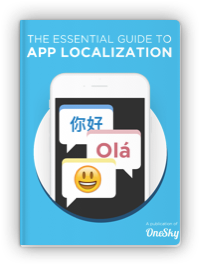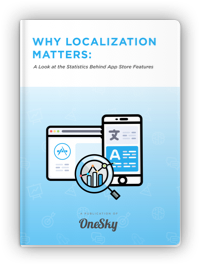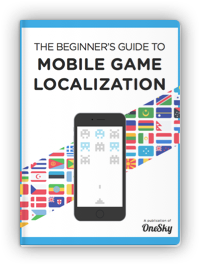Which Game Localization Company Should You Work With?
Every game developer and designer starts out with the dream of creating the next WoW or Fortnite. But to build a worldwide brand like this, you need to make your game fully accessible to players around the world. That’s where game localization companies come in.
With a good partner, you can translate and optimize every aspect of your game. Players won’t even realize it was made somewhere else in the world.
Of course, finding this kind of service isn’t always easy. To help guide you through the process, we have created a straightforward checklist. Keep reading to discover how to choose the right video game localization service for your project.
Why You Need a Video Game Localization Partner
For any small studio or indie developer, the idea of DIY localization sounds appealing. But in reality, this approach rarely pays dividends. While you might be able to use automated translation tools to handle some aspects of the process, it’s unlikely that you will be able to deliver a great user experience.
In contrast, localization specialists should make your game feel natural for players in every market. As a result, those gamers are more likely to stick around. In turn, this means you should get better player reviews, and generate more revenue from in-game purchases.
Hiring a game translation or localization service also means you can launch into more places in less time. Given the size of certain gaming markets around the world, every extra month of revenue could provide a massive return on investment.
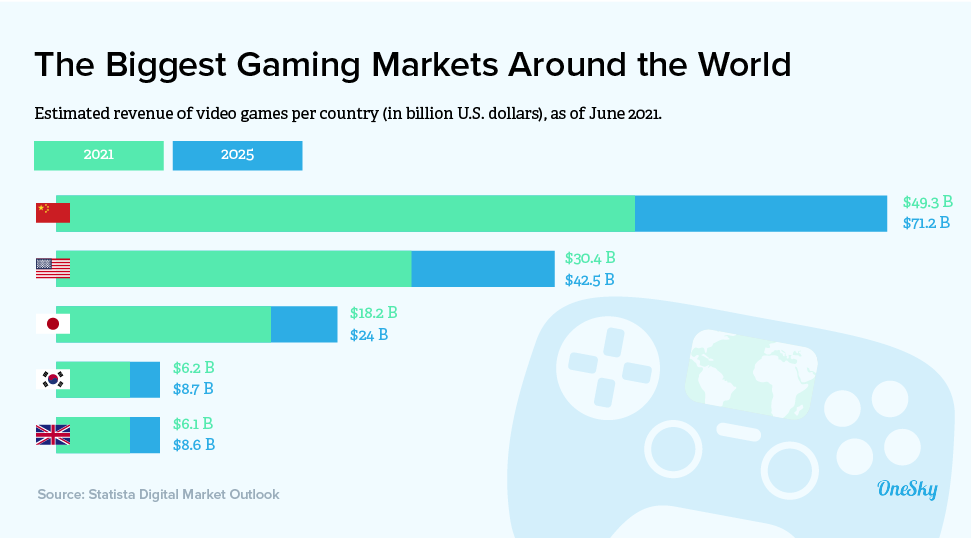
To make localization more accessible, we created a lightweight framework. You can find out more by downloading our free ebook, The Beginner’s Guide To Minimum Viable Localization (MVL).
How to Choose a Game Localization Service
To make the most of such opportunities, you first need to find a game localization company to work with. Finding the right service provider might seem like a daunting challenge — but like most things in life, it’s easier when you split it into bite-size chunks.
To make the process more palatable, here’s a very tasty three-step guide:
1) Find a Company That Understands Video Game Localization
The localization process is always demanding. To deliver a high-quality product in multiple languages, you need input from expert linguists with a range of skills.
Video game localization is an even more specialized skill. Professional translators and project managers need to understand how games work and how players think. For instance, there is little point in asking a translator with no knowledge of gaming to understand terms like “frag” and “gg.”
For this reason, it’s really important to find a localization company with the experience and personnel to handle gaming projects. If possible, seek out businesses that have a track record in this area. Look for case studies or testimonials, and try to check out some of the games they have localized.
2) Dig Into Their Localization Workflow
Gaming is a diverse space. From mobile games on iOS and Android to the latest AAA titles on Xbox and PlayStation, there are many different platforms and development frameworks that localization companies have to cover. Inevitably, some of these platforms may fall by the wayside.
When you go looking for your game localization service, keep this point in mind. Even if a particular company does have all the necessary skills and experience to show, they might not have a workflow that fits with your own.
In your research, try to find out how each localization service operates. If necessary, get in contact and pose this question within your enquiry.
While some companies might only offer a simple upload-download workflow through an online portal, others may provide integrations. For instance, OneSky has plugins for Unity and Unreal, meaning you don’t have to mess around with individual files.
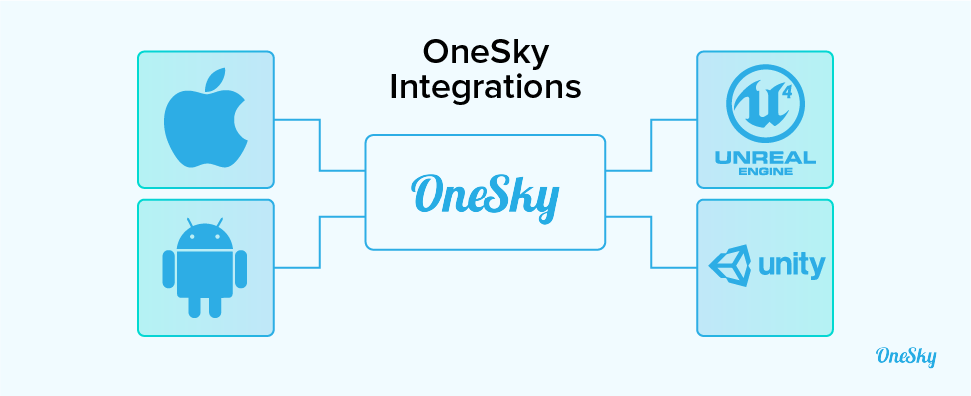
Translation and Localization Process
Just putting aside technical matters, it’s also worth quizzing potential service providers on their localization process.
Most professional translation services today make use of CAT
(computer-assisted translation) software. This technology utilizes language models to automate translation, while allowing professional translators to oversee the process and make changes as necessary. This system has the benefit of speeding things up, and it can help to reduce human error.
However, a CAT-based workflow is only as good as the person who is overseeing things. So, we recommend asking any potential localization partner about quality assurance.
Good companies in this space should have at least some basic checks in place to ensure that localized content is relatively error free.
Translation Management
If possible, we always recommend working with a TMS (translation management system).
This type of software helps you keep track of translated content in multiple languages, and many such platforms provide useful features like translation memory.
As you narrow down the field of potential game localization vendors, make sure to consider which companies provide a TMS platform.
3) Check Whether They Offer the Right Services and Languages
It’s worth remembering throughout your search that translation is just one part of localization. It covers only the text content within your game; all the other content must be adapted by other means.
As you grill the potential candidates for your localization project, think about what services you will need.
Does the audio track of your game include spoken dialogue? You will need to localize the voice-over, and adapt the subtitling for your target language. If your game includes real-world currencies and dates, you will need to change those as well.
Even the interface of your game might need an overhaul. Whereas gamers in the West will be put off by a cluttered interface, users in markets like China and India tend to respond well to a menu screen packed with options.
Putting it all together is no mean feat, so it’s a smart move to run some tests. Some game localization companies offer on-device testing as a service, and can provide proofreading for written content.
Language Pairs
Bear in mind that many companies only offer such services for a limited range of language pairings.
If your source and target languages include English, Spanish, French, Japanese, Korean, or Portuguese, most vendors will be able to help. However, fewer companies will be able to localize your game for languages like Norwegian and Swahili.
At OneSky, we cover 50 languages — so there is a fair chance that your chosen language pairings will be on the list.
Project Management
Even for an experienced developer, managing an entire localization project is quite a task.
Experienced service providers recognize this, and so will often put forward a single point of contact who can help you to manage and implement game localization. This can be a massive help, especially if you work alone.
It’s definitely worth enquiring about this as part of your research on potential localization partners. It probably won’t be mentioned online, so you will need to ask the question via email or a call.
Other Factors in Choosing Your Localization Company
By working through the main steps above, you should be able to come up with a fairly strong selection of game localization vendors.
But how do you narrow down the shortlist to one provider? Well, there are a few more areas you might want to consider.
Pricing
Obviously, your choice of localization solution will be somewhat dictated by your budget. Some companies charge more than others, and pricing often varies according to the scope of your project, and the particular language pairings you choose.
Larger projects, such as a MMO on PC, are often cheaper on a word-for-word basis, and languages with the most native speakers tend to be more affordable.
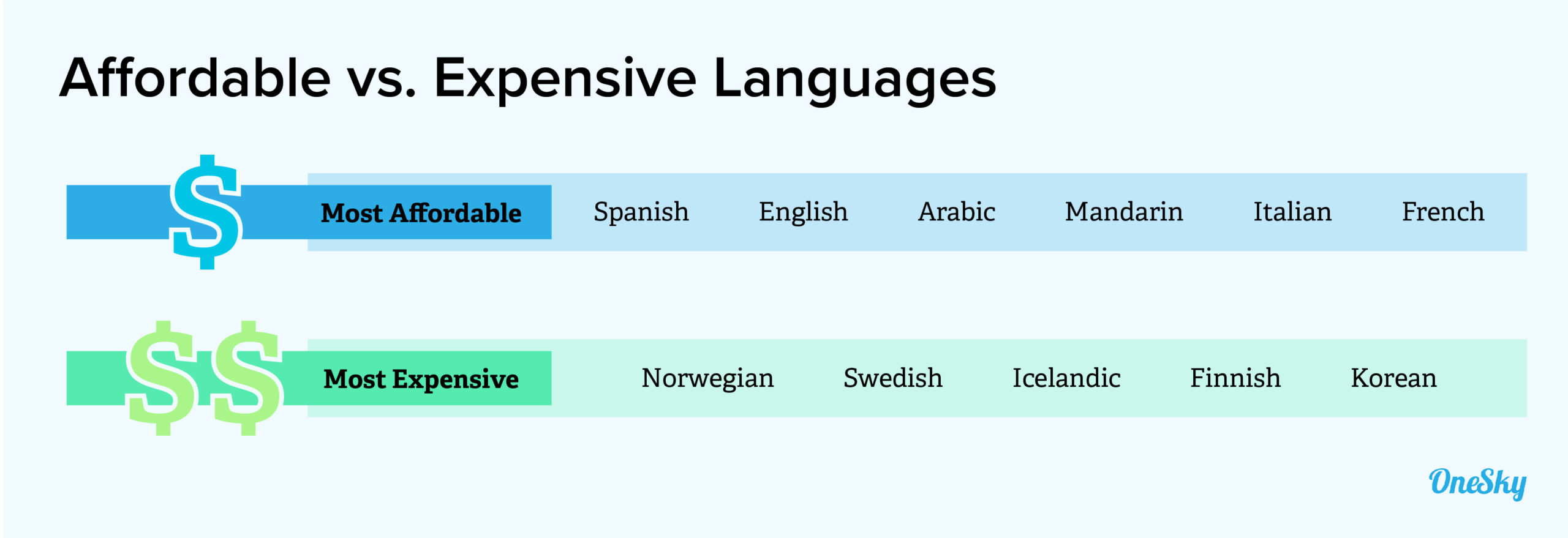
That said, you will find significant differences in the market. While OneSky offers localization from $0.04 per word, other specialists may charge ten times that price. In other words, you should definitely shop around.
Company Culture
When you team up with a localization company, you’re doing more than hiring a service provider.
The people who translate and adapt your game are custodians of your franchise. They are responsible for making sure that every word carries the same meaning in different languages, and that the storyline still makes sense.
Other localization experts have to ensure that dubbing looks natural, and that interactive elements of the user interface will easily be understood by your target audience. And testers, who are your eyes and ears, must pick up any mistakes in a language you can’t understand.
What does this mean? Well, you need to trust any localization team you hire.
Once you are down to the last few candidates, set aside some time for a meeting with your point of contact at each provider. Along with questions about workflow, try to get a feel for the company culture.
If possible, get in touch with some of their past clients. This is perhaps the best way to understand the company ethos, and what you can expect from a working relationship.
The Game Localization Checklist
As we have discovered, choosing a localization solution for your game is a complex process. But it’s worth remembering that every minute that goes towards making your decision is time well spent.
Almost every successful game franchise today is popular in international markets thanks to skillful localization. If you want to follow suit, it’s vital to find the right experts to help you deliver a similar user experience.
To recap, here’s a checklist for your search:
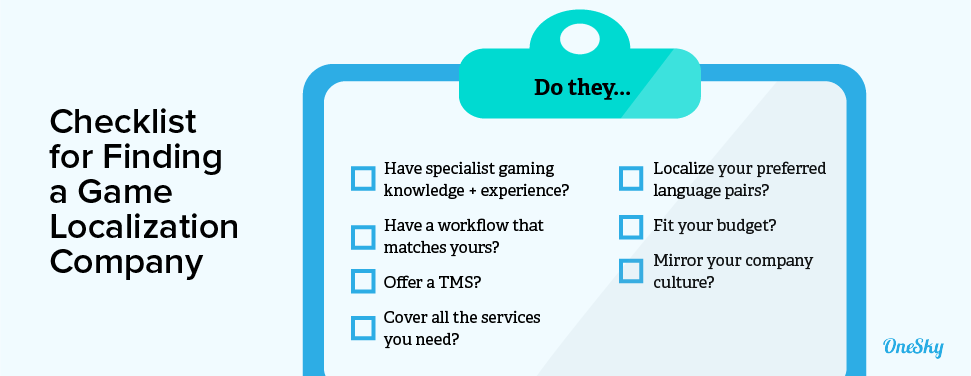
Localize Your Game for the World With OneSky
If you’re looking for a reliable game localization service with a proven track record, OneSky should be on your shortlist.
Our end-to-end platform syncs with Unity and Real, along with popular iOS and Android development tools. You can manage multiple versions of your game through our translation management platform, and we have over 1,000 expert translators to cover 50 languages.
Want to take a look around? Sign up today for a free account!

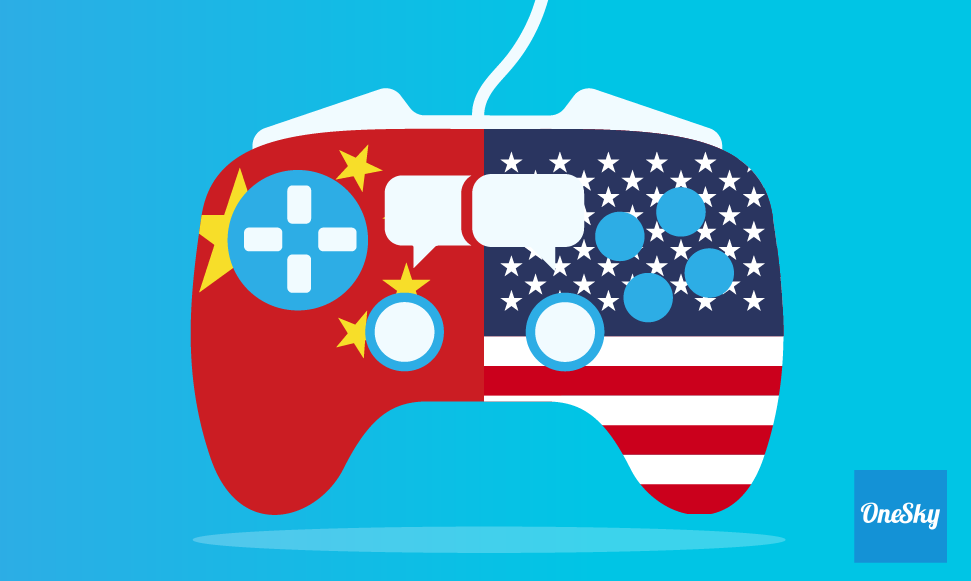
 Written by -
Written by - 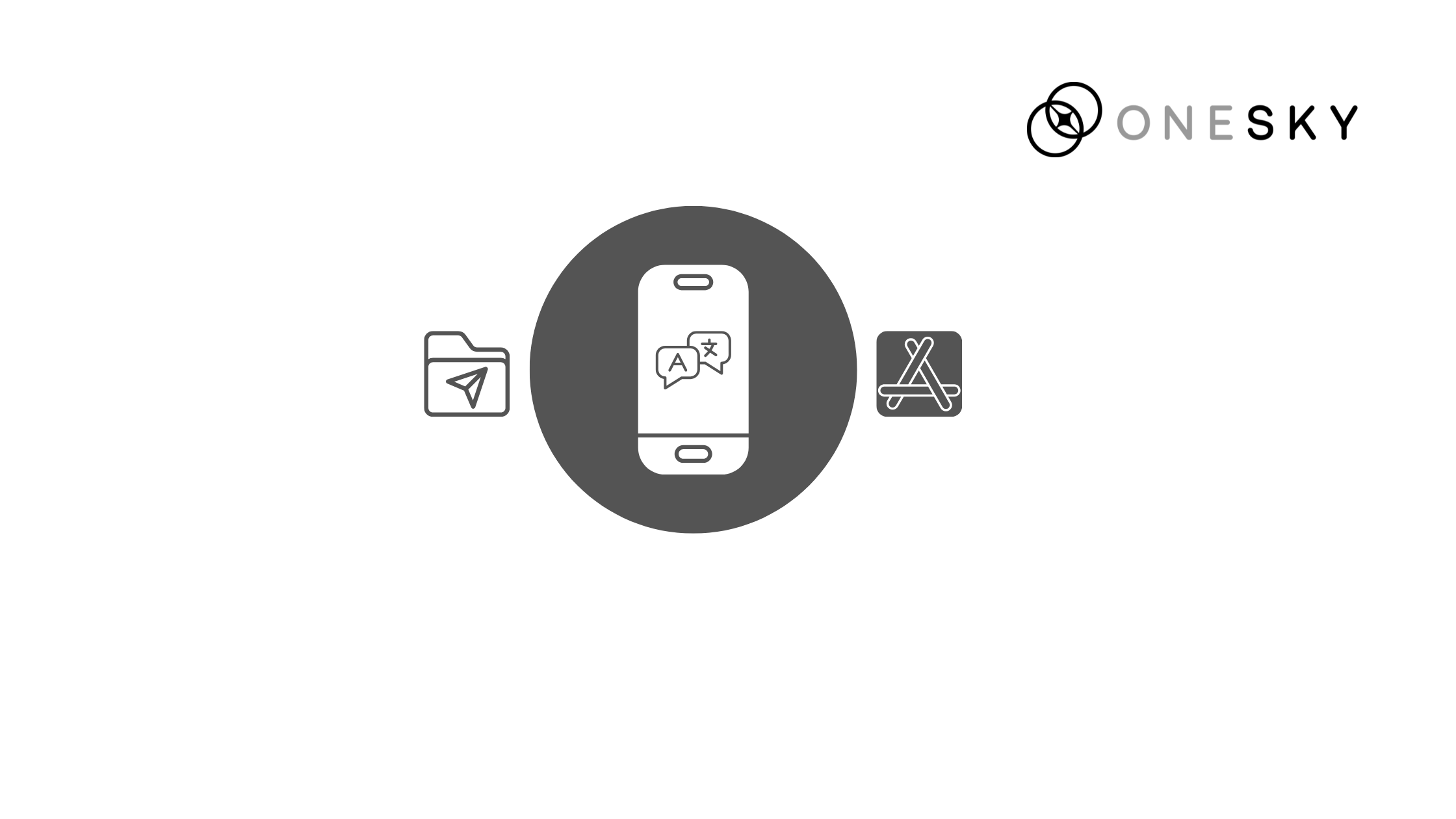


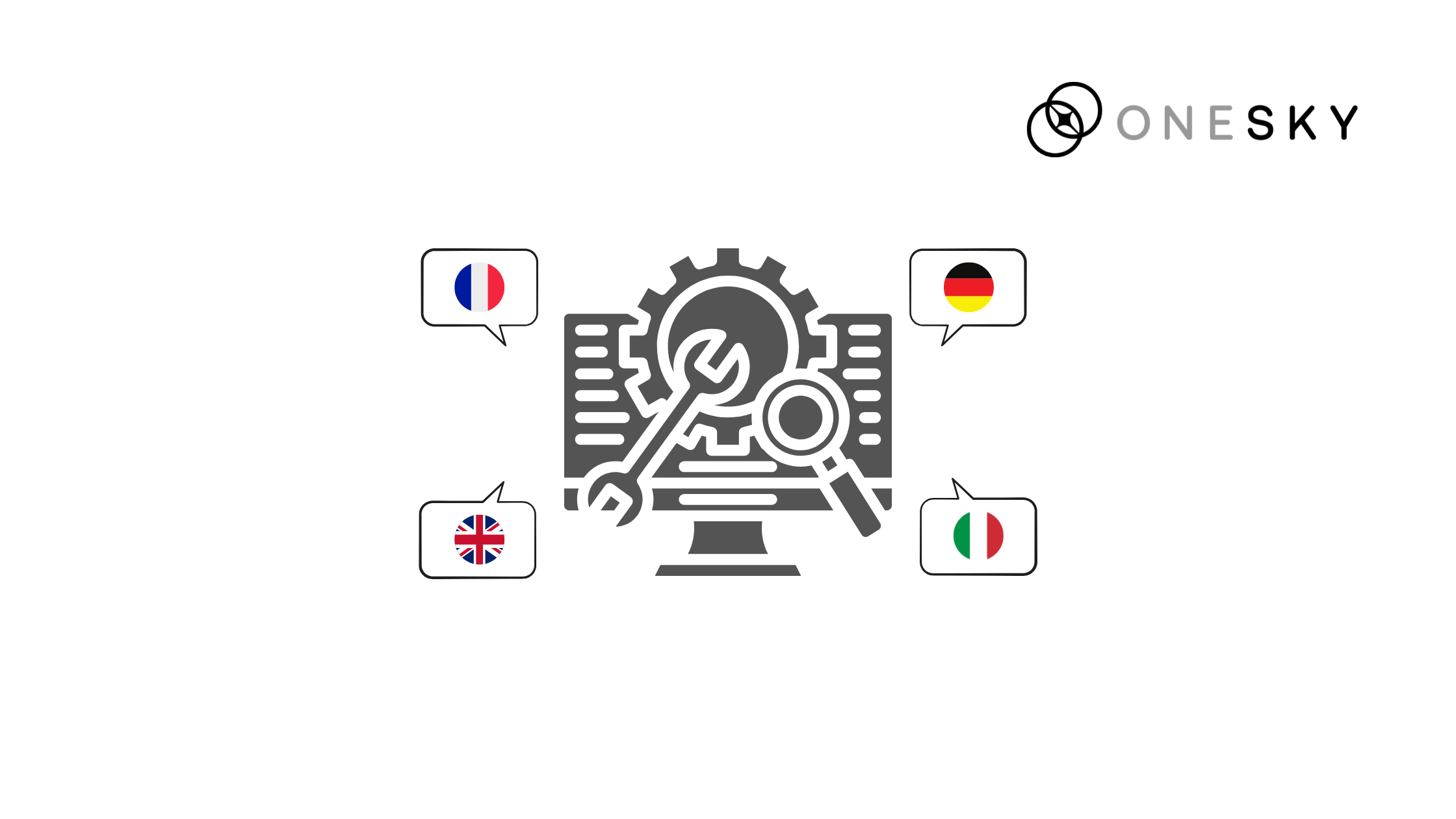
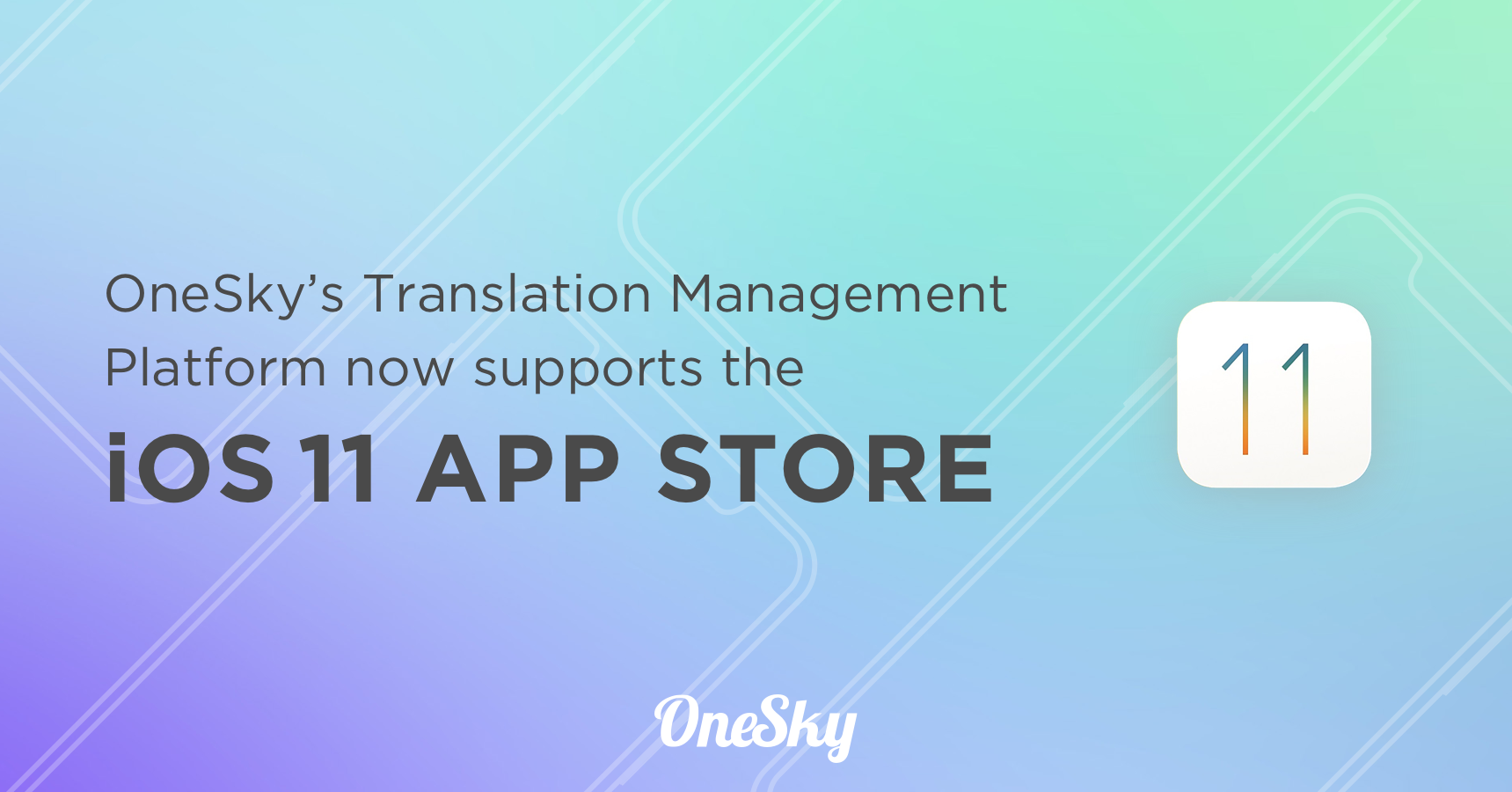
 Written by
Written by 
